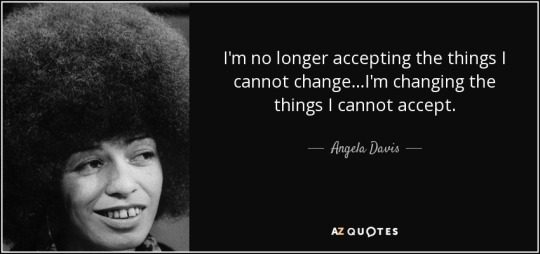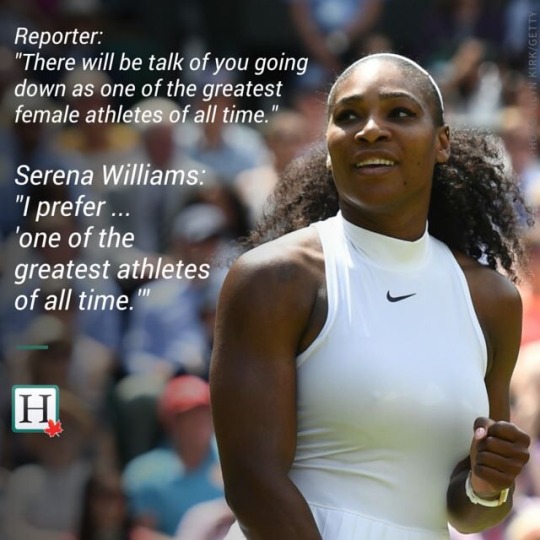Photo
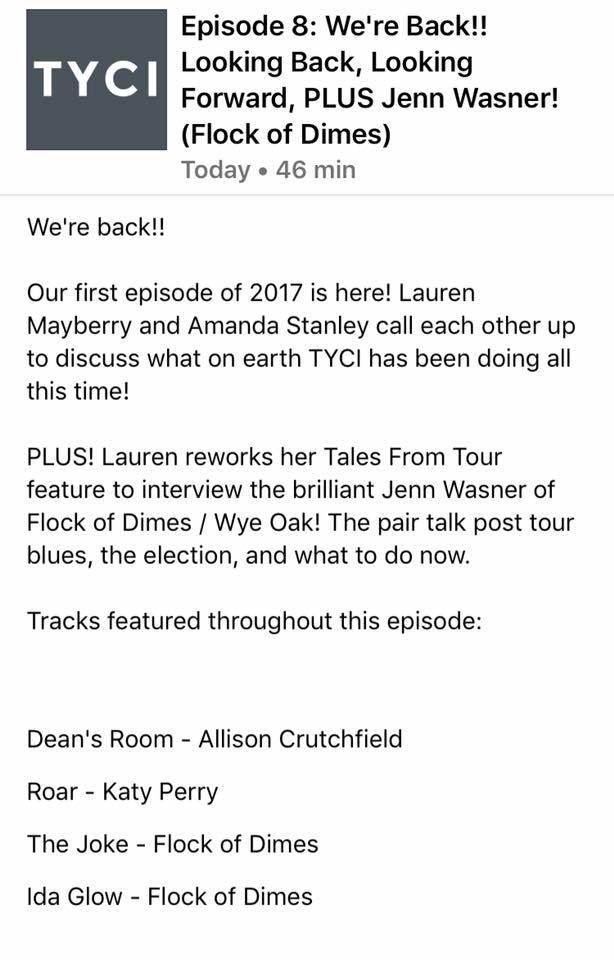
The latest episode of the TYCI #podcast is now oniTunes. We talk about where we've been / where we're going, and #LaurenMayberry interviews#JennWasner (Flock of Dimes / Wye Oak) with additional music from Allison Crutchfield and Katy Perry. Edited by Amanda Stanley.
GET IT NOW: http://apple.co/2k8jLHS
#tyci#feminist#podcast#feminist podcast#lauren mayberry#chvrches#lauren chvrches#amanda stanley#jenn wasner#interview#podcast interview#flock of dimes#wye oak#katy perry#allison crutchfield#itunes
1 note
·
View note
Photo

After taking a bit of time to regroup behind the scenes, TYCI are looking for content for our soon-to-be relaunched zine, which will be published in the final quarter of 2016.
We are looking for submissions from new and existing contributors to help shape this new chapter of TYCI, which will include a brand new quarterly zine.
Your content could be written words (interviews, opinion pieces and commentary, fiction, poetry), photography, graphic design or artwork – anything that you think would appeal to the TYCI audience and fit within our brief of creating a space for female voices to be heard.
Pitches should be sent to [email protected]. The final copy deadline is MONDAY 3 OCTOBER.
Can’t wait to hear all your ideas!
6 notes
·
View notes
Photo
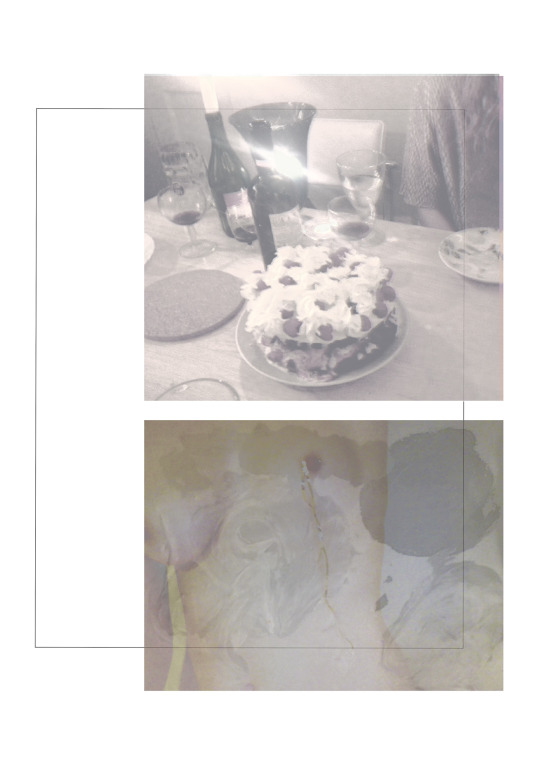
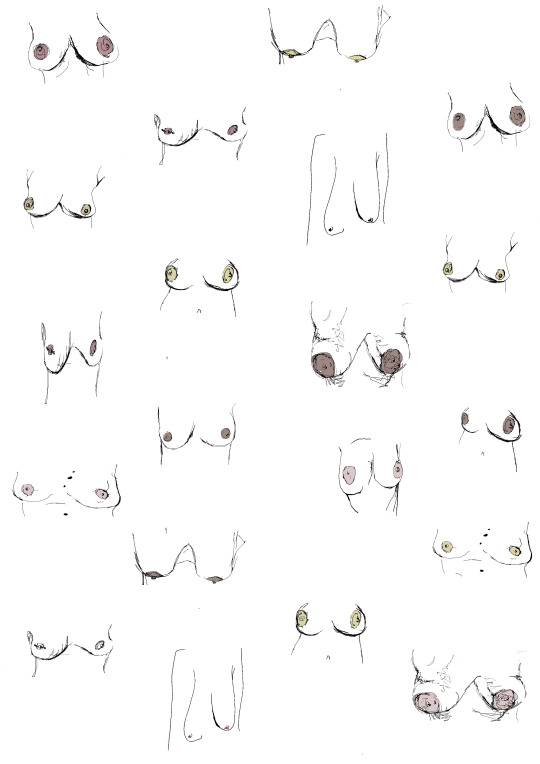
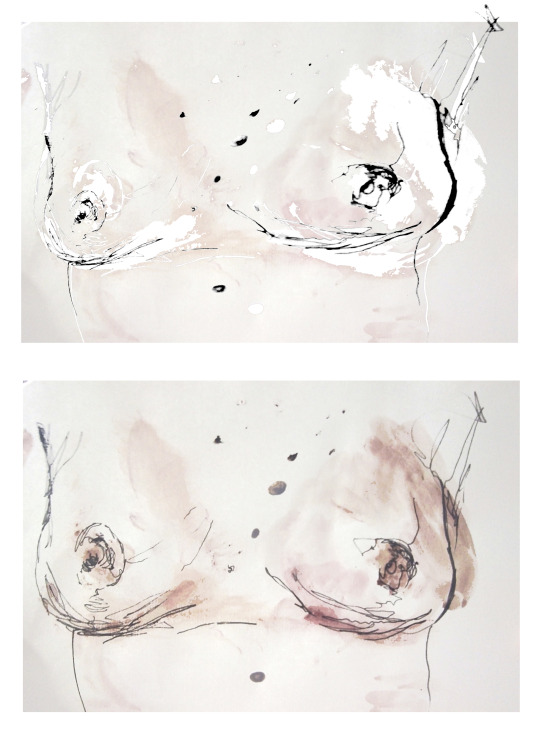
Edinburgh-based design student Rosana Exposito tells us about her most recent project.
This series of work initially started from the knowledge that a lot of women dislike their boobs. I hate it when my friends put themselves down, so these artworks could be considered the creative equivalent of the very female ritual of saying, “No, you’re beautiful! No, YOU’RE beautiful" and I’m okay with that.
From a young age ,we are all aware of the fact that a majority of women feel shit about their bodies. We learn to accept it as part of being female / human. I don’t think we should. It’s not okay for anyone to feel consistently uncomfortable in their skin. I think we have gotten to a stage where this is almost accepted as part of being female and these insecurities can massively affect someone's confidence. It can stop us from fully immersing ourselves in a moment; to sit literally sweating our titties off on a sunny day because we’re too self conscious / ashamed to take our tops off; to go out wearing not what we love but what will cover our ‘’bad bits’’ in order to minimise our self hate that night.
Many of these insecurities are so common among women because of the taboos surrounding exposure of the female body. It’s completely logical to me that if we only see photo-shopped breasts in magazines, porn and actresses on TV, then we are being sent a clear message of what a naked female body should look like. And, let's be honest, very few of us fit into this category. If female bodies were subjected to less censorship day to day and we saw more variety, women would start to feel better about themselves. We would all be able to see for ourselves the large diversity of body shapes there are and also see the beauty that they each hold. What if we all just showed each other our tatas? Told each other how beautiful we all are, and gave each other a massive boost of self confidence and love?
Obviously we, as a society, have a bit of a way to go before this becomes acceptable so, in the meantime, I’ve created an illustrated equivalent of it to get the ball rolling. This is when I began to draw breasts. And lots of them... My aim with this project was always to illustrate a diverse range of body shapes and to say a big ‘fuck you' to what I believe to be sexist censorship of the female form by mainstream media. When I initially attempted to draw a diverse range of female body shapes from my imagination, I realised I had almost subconsciously started to draw skinny white girl boobs (as this is basically all I have been exposed to) but that was not the point of my project at all. Stemming from this realisation, the project then increasingly became about promoting diversity and acceptance for all female body shapes. I collected photos of lots of different breasts and body types from inspiring women I know who volunteered to be involved with my project. All my illustrations are drawn of these wonderful women. I hope that, if my drawings don’t instantly eliminate all your body confidence issues (ideal), they will at least encourage you to be a little less harsh on yourself and your breasts. They, after all, do not deserve that.
[Rosana Exposito]
For more on Rosana's project, visit her Redbubble page.
6 notes
·
View notes
Photo
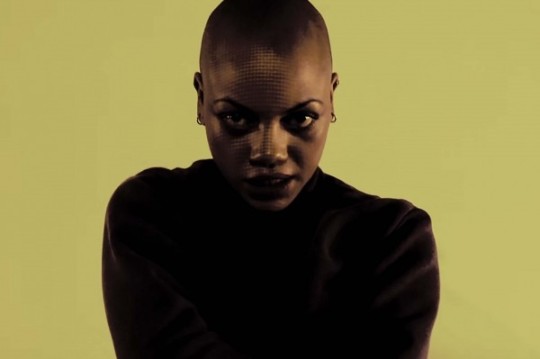
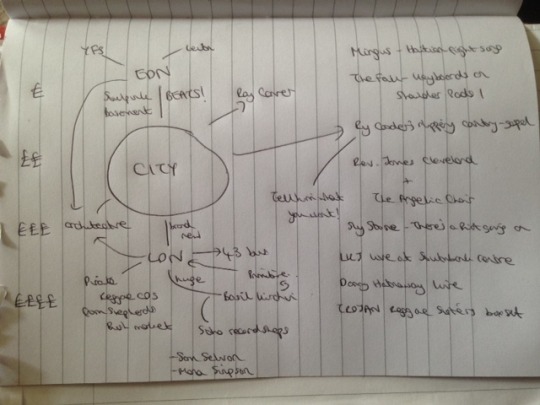
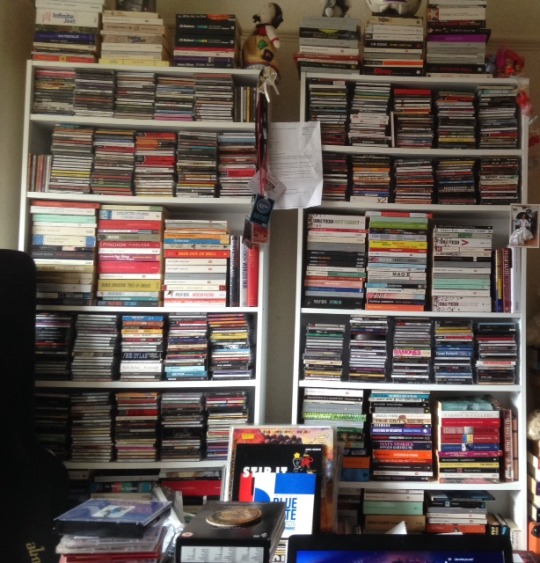
Musician Law Holt writes about the making of City, her latest release.
We needed music. Fast. Tim London and I had spent the summer of 2015 making an album of crafted, soulful pop called Gone. City began as an experiment, a reaction to what we’d just done. We were challenging ourselves to come up with new and inventive pop music to re-introduce Law back into an already crowded scene. At this point I was living between two capitals (Edinburgh and London). On New Years Day 2016, I got on a train to Waverley from Kings Cross determined to be returning a few days later with something brand new.
Work in the Soulpunk basement was just as it always had been. Artists are often full of neuroses and superstitious habits which they find intrinsic to the process of creation. I always buy my writing books from the pound-shop (those elaborate leather and buckle things make you feel like you should be writing sonnets in them). I always write in pencil too. Then there can be no finality and no embarrassment about throwaway ideas. Tim had beats in the bag. He loops them over and over in my headphones. I nod in approval, the mic goes on and I start to write. I figure out where the parts should sit. Hooks and phrases usually come first because these are the building blocks of any decent pop tune.
We recorded and wrote other parts in a studio off the Holloway Road. The guy working there moved the metal band next door so their power chords wouldn’t bleed into our mics. We only had a couple of hours and Tim had forgotten a vital piece of his portable studio. But with plenty of gaffer and willpower the make-shift system held up and we got the takes and the hooks. Afterwards we stalked Holloway Road amongst all the Arsenal fans looking for a disposable camera to take some photos. We were met with baffled looks and suggestions that we join the 21st century and use a smartphone. But the easiest, cleanest, and most convenient way isn’t necessarily the best. Doesn’t that sum up our whole approach?
I’ve always treated my voice as something worth working on and improving. It is my instrument. It’s my meal-ticket. It’s the one thing I have which I know is beautiful and valuable and different and all mine.
Around the same time I was reading Anywhere But Here by Mona Simpson. It’s a story about a girl who has a damaged relationship with her mother. They travel around America chasing her Mother’s grandiose delusions. I managed to read it quite quickly as I was working a day job in a café that was so quiet that you could just stand and read all day, making the odd vanilla latte. There were passages I’d read and begin to well-up and have to try and wipe the tears before someone needed to be served. My pockets were filled with café napkins. What struck me was the Mother’s constant need to impress regardless of anyone else’s feelings towards her. That was upsetting and I started seeing the same behaviour all around me. I only try to please myself now, I don’t have many friends.
Musically I was listening to a lot of beautiful, clipped pop albums. Deerhunter’s Monomania, Lykki Li’s Youth Novels, Blackheart Man and lots of Tropicalia. The best music allows you to fantasise that you yourself are singing it. I invented characters to sing to. Exaggerated bad men from previous lives and unrequited loves that still creep in on a lowly day. Country music is good for that kind of thing. I was also listening to the best of the female reggae vocalists. They occupy their own space entirely, that sweet harmony lying on top of that tough bass just does it for me; that’s making the best of life.
‘Spit’ was the last song we recorded on one of the first sessions. It was one of those beats where everything fell into place in my head almost immediately. This is the case with most of my best songs: ‘Hustle’, ‘Haters’, ‘Love Drive Through’. Tim threw over a piece of paper with the words “Spit from your lips” written on it and I pinned it right in the heart of the song... My train was at 16.30 so we finished recording at 15.30. I sat on the train back to London, can of cider in hand, with the 'Spit' refrain swelling in my head.
As women we’re not attuned to doing things for ourselves. We are nurturers, mothers, givers. I made this music for that girl growing up in Leicester who worked in the Black hair shop which constantly played Radio one, wanting to make something different, who took her wages straight to Leicester Vocal Tech, determined to improve. I’d like to play her this album, I think she’d be proud.
[Law Holt]
City is out on 26 August via Soulpunk. For more on Law, visit her website.
2 notes
·
View notes
Photo
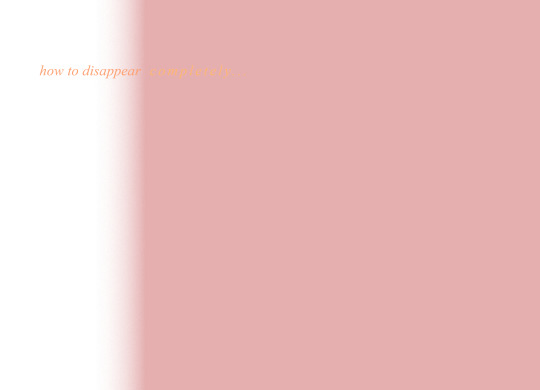
Rosie Davies writes the latest entry in her Good Mental series on life and sanity, this time taking a satirical look at how the media talks about body image and weight loss.
Do you ever accidentally catch sight of yourself in the mirror and feel like a big fat disgusting slob? That’s probably because you are one!
Here at Shame! we know how easy it is to let yourself go. We’re just like you! Whether it’s a cheeky crisp at the pub (3 calories) or a naughty oatcake with your soup (17 calories), we all need to let off steam sometimes so don’t feel too bad about those 20 calories - we’re all human after all and, like we’ve just said, we’re just like you, too. We wouldn't be real women if we didn't obsess over everything that goes into our mouths!
The problem is, of course, the feelings of guilt and shame the following day, when you just can’t stop thinking about that crisp and how you let it happen.
But don’t worry, we’re here to help! We asked five Shame! writers to give us their top tips for when they’ve needed to lose a few pounds - and fast!. To save you having to waste too much cognitive energy in reading this and risk resorting to snacking, like a complete failure, we’ve handily summarised our tips into five bitesize chunks. Follow these bitesize chunks of advice and you’ll soon be feeling - and, more importantly, looking - like your fabulous thin self again!
Bitesize chunks. OMG. Chocolate fudge brownies. Mini pizzas. Those cheese and onion pastry roll things from M&S.
(1) Obsess over your mistake
Provided you keep focusing on what you did wrong, to the detriment of your job, social life and mental health, you’ll feel bad enough about yourself to give you the motivation to never, ever do it again for fear of spiralling down the same tunnel of guilt, shame and self-loathing. After a few weeks, you will have successfully cancelled out the horrendous damage you’ve done to your body, like the big fucking disgusting greedy unloveable hound that you are, so you can strut down that street and feel morally superior to everyone else for being thinner than them!
(2) Worry more
A groundbreaking new study at the University of South Cockend-on-the-Knees has proved that worrying, particularly about things that don’t really matter and therefore have no tangible, practical solution, actually eats away at your stomach lining. Not only does this burn a lot of calories, it also physically reduces your body mass AND makes it more painful to eat, which means you’ll be less tempted to consume food to be used by your body as fuel, aka being a big greedy disgusting mess of a human being who was probably conceived by accident.
As an added bonus, the particular worry as to why you’re so self-absorbed into constantly thinking about your weight and attaching it to your self-worth - even though you know you’re an intelligent, forward-thinking woman who shouldn’t worry about these things but you just do, still, and you hate yourself for it - is actually classed as Meta-Worry. A Meta-Worry is a worry within a worry and is a particularly calorie-burning type of worry due to the dark, fierce, punishing nature of the thoughts they induce. Now, as women, who are not interested in science, that’s the kind of science we like!
(3) Get ill
Depending on how much you’ve over-indulged the night before, illness can be a great way of losing that disgusting extra weight that’s attaching itself to your bones like some sort of layer of protection designed to do things such as keep you warm, keep out harmful viruses and protect your bones (ughhh!). If we’re talking a couple of calories, for example, either a bad cold or a mild flu will be enough to stop you eating properly for a few days. As anyone who has ever lingered over the office kettle, or who knows someone over the age of 65, will be aware, there is always a nasty flu thing going around, so one optuions is to cover yourself in petroleum jelly and stand naked on the subway at rush hour, inviting people to spit on you. You might feel a bit silly, like one of those women who runs in the park pushing a pram, but the joke will be on everyone else when you get ill and thin again!
If you’ve really blown it and eaten half a pack of Nik Naks on the way home from the pub before realising the horror of what was happening, you might consider something more serious, such as malaria or, if you ate the whole packet, death. Just kill yourself. There are some things you just can’t recover from.
Nice 'n' Spicy Nik Naks. Packet of salt and vinegar Discos. Monster Munch! Family bag of Kettle Chips in between endless slices of thick bread slathered in butter.
(4) Lose a limb
How many times do you really use both of your legs?
For even faster, more fabulous results, consider cutting off an arm. That way you literally won’t be able to open the mayonnaise jar to dip your seventh slice of pizza in, like a BIG GREEDY DISGUSTING MESS OF A HUMAN BEING WHO DOESN’T DESERVE TO HAVE ANY FRIENDS OR HAPPINESS OR EVEN BE ALIVE.
(5) Get an eating disorder
Now, eating disorders get a bad press for all sorts of reasons. Whether it’s the fact that they literally kill people, the fact that they mentally kill people, in terms of tearing apart lives, friendships, families and sanity, or the fact that people suffering from this debilitating mental illness are still - still! - judged and criticised as being self-absorbed and vain, there’s no denying that they get a bad rap.
I mean, you might become depressed, anxious and even suicidal - but you’ll look great at the same time. And by great, we of course mean thin. Thin!!!! You will float up above the rest of the sad, flabby, weighty mortals, light as a feather, hollow bone etching against hollow bone, and disappear. Free of the pain and torment of having a body which will be judged and criticised and commented upon like a piece of meat at the butcher’s, as if the size or shape of it somehow related to your worth as a person, the amount of love and affection and happiness you deserved.
Next week in Shame!:
- How to love yourself and feel fabulous no matter what size you are (so long as that size is between a 6 and 8 in UK dress sizes)
- How to exactly what you like and STILL lose weight (spoiler: all you need to do is throw up what you’ve just eaten!)
[Rosie Davies]
This article is satirical. As with all TYCI features, we encourage thoughtful and considered discussion of the issues references in this piece. Read the rest of Rosie’s Good Mental columns here.
1 note
·
View note
Photo
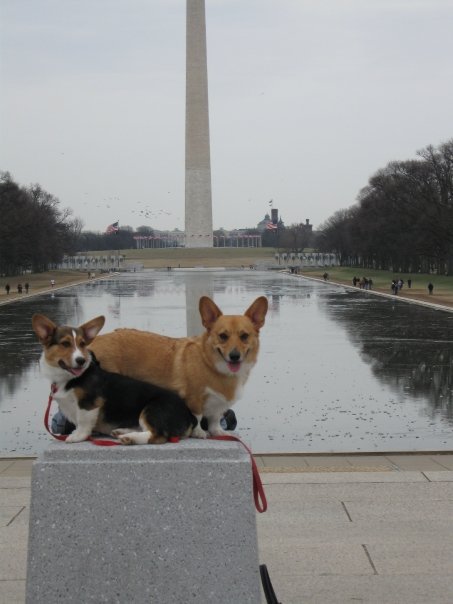
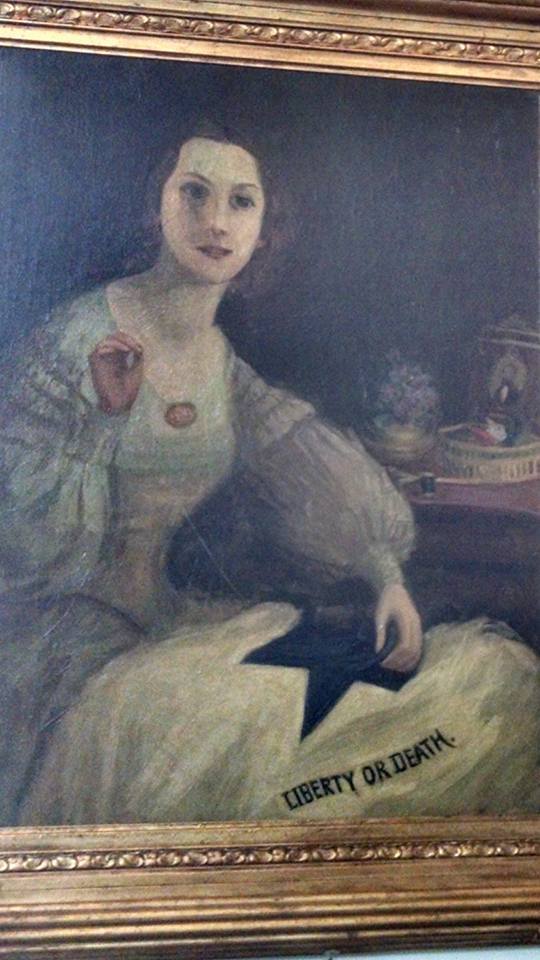
Sarah Brosenstern discusses gender, leadership, and women in the workplace.
Occasionally when I mention a professionally accomplished woman who I know, such as my doctor or my mother (a solicitor), my fiancé will say (with mock incredulity), "A woman solicitor/doctor/supervisor!!? That's impossible!"
Then he typically flails his hands, seemingly panic-stricken, and I usually laugh, sometimes forgetting what I was talking about in the first place.
But being a woman in the professional realm can be chaotic, with a barrage of social messages that come from men, other women, the media – you name it. Magazines frequently ask in wonderment "How does she do it all?" in regards to women who balance their careers, children, and domestic tasks. Or, the same publications promise that "You can have it all!" - If only you knew their secret strategy, hidden within the pages. (“Use your infant as mop!” or “Teach your Welsh Corgi how to make five-minute meals for the family!”
It is presumed that men have someone to delegate domestic duties to, or presumed that they don't have domestic obligations at all. Women still face professional discrimination over the assumption that they will leave the workforce to have children, or become too embroiled in childcare obligations to be an effective professional. Women who balance both a family and demanding professional careers often face an undeserved amount of judgement from others - in societal binaries that so often portray women in the professional realm as overly-ambitious, selfish ice queens who never have time for their sad little children…..or unfortunate little worker bees or housewives who as a result of their children, have been unable to realize their professional potential. It is exceptionally difficult for women to exist in the workplace without being forced into a particular judgmental narrative, and this absurd need to put women in labelled boxes diminishes the fact that we are just doing what everyone else does –trying to find a balance between all the things that we find fulfilling in our lives…and making sure that the bills are paid on time.
Yet women in the workplace are still seen as being somehow different. Young women entering the workforce receive a bombardment of (often unsolicited) advice on how to reconcile being a women and a professional x, as if they are somehow mutually exclusive – as if, to be competent, you have to become “one of the guys”, or at the very least, some sort of un-gendered being. During one of her first legal battles as a young solicitor, my mother was once told by the opposing side that she “needed to stop thinking like a woman and start thinking like a solicitor.” (For the record, she won the case.) Women are told to never bake anything for co-workers (“They’ll look at you like you’re their mum, forever! They’ll never take you seriously!”). Women are also told to immediately bake things if they’re new to an office (“If you’re new, it’s a great way to make friends! Everyone likes snacks, and it’s a good excuse to chat and get to know people a bit better!”) Women are told to look put-together all the time, because nothing is as terrible as an unkempt woman. Yet women are told to not be too showy, too attractive, because it will bring out the “inherent cattiness” of other women (which is supposedly something that must exist), and then they won’t be liked by the other women. This is important, because being likable is a critical component of being a woman in the workplace. And nothing diminishes a woman’s likeability quite as much as not putting up with other people’s crap behaviour. Women who do not put up with crap behaviour are undoubtedly harridans, quite possibly feminists, and definitely, absolutely, not likeable and/or fun. But again ladies, don’t be too fun, or too likable, because women who are too much of “one of the guys” are hated by other women.
This volley of gendered behaviour standards doesn’t just impact young women who are the office newbies. Women in leadership positions are constantly accused of being “bitches” or being “bossy” for behaviour that (in men) is labelled as being “direct” or “assertive.” Women who are particularly engaged in a project are seen as “emotional,” whereas men are seen as merely “passionate.” Men openly complain that offices with female leadership are just inherently more catty, more gossipy- yet I have been in plenty of environments where male leadership, (both professional and academic) has openly gossiped to their peers. Sometimes, the gossip was so profoundly negative that particular personnel, students, could not even get a “fresh start” anywhere else without a negative reputation preceding them.
This is not to say that every woman in the professional realm is a benevolent goddess. I have had negative experiences in which female leadership was unable to avoid projecting their own insecurities onto their personnel; interpreting any disagreement, any criticism, as a sign of disloyalty –and immediately alienating anyone deemed as “disloyal.” Yet I am happy to say that this was a rare occurrence in my professional life, and I was fortunate enough to be able to move to a different job. Even now, I sympathize with her paranoia – in the professional world, it’s altogether too easy for women to succumb to the pressure of all the conflicting messages about women in the workplace; to feel like there’s no way to possibly get it right and that everyone is against us, judging us, scrutinizing us.
So in the end, I will offer no advice here other than the following: Do your job, try to do it well, and stop worrying so much about the little labelled boxes.
[Sarah Brosenstern]
Sarah is an American writer on social issues in the Washington, D.C. and Baltimore, Maryland area. For more of Sarah's work, visit her website.
Read the original article on our website here: http://www.tyci.org.uk/wordpress/all-about-that-place
1 note
·
View note
Photo
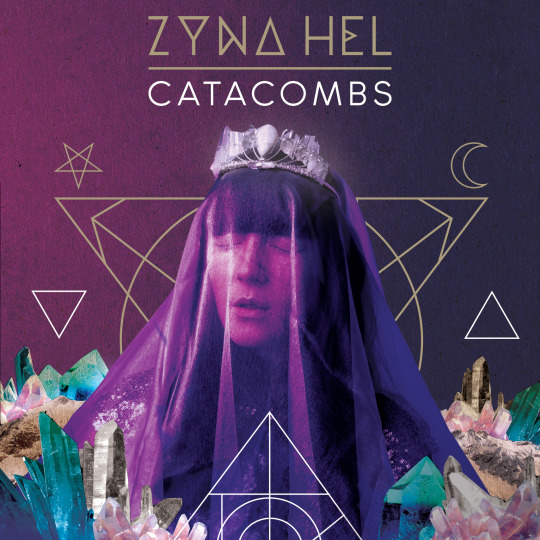
Rebecca Moore interviews self-proclaimed "disco witch" Zyna Hel.
How would describe your sound for our readers who might not be familiar with your work?
I write magical pop songs for starseeds and strippers.
What are the themes within your latest single Catacombs and why did you choose to explore these?
The themes are around mother and daughter relationships and the ways in which we can inherit our parents’ issues and unconsciously play out the same patterns in our lives. I didn’t consciously choose to explore this theme though. I write lyrics in a stream-of-consciousness way: it was only in retrospect when I started reflecting on the lyrics that I realised they were inspired by my relationship with my mother and the myth of Persephone and Demeter, a story I’d been really immersed in at the time I wrote Catacombs.
As a female artist, how do you deal with issues around gender equality and do you draw these experiences into your art?
I deal with gender inequality by immersing myself in the things I love to do. As a musician I'm acutely aware of my gender. Sexism in the music industry is insidious, it's so ingrained you could almost miss it, but it's there more than in other industries I've been part of. I deal with it by keeping going, just doing what I do. I think that really that's the key. Just doing what you love and pushing back against prejudice and not letting it get to you. I don’t know if I consciously draw these experiences into my art, but I suppose it’s inevitable they will show up there in some way.
How do you find freedom and a voice within your music?
I really believe that in a world that wants females to fit in to a certain box, just making your own art on your own terms is a radical act, regardless of the subject-matter or content of the work. Just getting to do what I love gives me freedom and a voice.
What was it like collaborating with Benjamin John Power of Fuck Buttons?
Ben is an incredible musician and a great friend, it really was a pleasure and privilege to work with him on this song. When Ben heard my original demo of Catacombs he asked if he could have a go at producing it. Ben's production took the song to a place I couldn't have imagined taking it on my own, it was just so perfect.
You draw a lot of inspiration for your music from the Occult and Mythical worlds. What is it about this that inspires you?
I guess it’s just a big part of my life so it feeds organically in to my music. I’ve always been drawn to mystical and metaphysical things and I have my own spiritual practice. I don’t consciously bring these themes in to my music, in fact for ages I didn’t even realise they were there until people started commenting on it. There are lots of grounded themes in my work too though like love, sex, motherhood, etc.
Do you think within these realms sits an opportunity for female expression that might not exist otherwise?
This is a really interesting question. I hadn't thought about it before. I think that traditionally the 'inner worlds' have been more accessible to women. However, like in other areas, women’s mystical experiences and ideas are less documented than men's.
I just finished reading Be Here Now by Ram Dass. The first part of the book includes an account of his time spent in an Indian ashram with his guru. This part of the book is full of accounts of incredible mystical experiences, and while I loved reading about it all I couldn't help notice how absent women were from the narrative. Ram Dass speaks at one point about the fact he was 'low on the ladder' at the ashram and had to ride in the back of the guru's land rover 'with the women’. I couldn't take the book's message as seriously after that. I'm sure things have thankfully changed a lot since the 60s though.
So to answer your question, yes. I think there lies a unique expression for women because we need to hear women's voices on this subject like on any other. We live in a time now where lots more women have the freedom to write their own stories, experiences and ideas and get them out in to the world. It's easier than ever now to self-publish and self-release, we don't have to go through the established routes to get our art out in to the world.
Catacombs was released via your own label, Occult Babes. Can you tell us more about the label?
I had a dream just after Prince died where he told me to start my own label to release my single, so I did.
How did you start your own label, and what did you learn in the process?
It was actually really easy to set-up, there are lots of services out there that make digital distribution very easy for small labels. What I learned was that I don't find that aspect very fun, I really just like writing songs and playing them, not so much the rest.
What are your musical inspirations?
I am continually inspired by artists who express themselves fearlessly. Prince, Kate Bush and Anonhi are a few that come to mind. I'm also really inspired by poetry, Edith Sodergran is a favourite of mine. I think the thing with inspiration though is that it can come from anything and anywhere and it's impossible to control, for me at least. I got the chorus lyrics for one of my songs from a brand of facial wipes 'Skin to Skin'. I was in my friend's bathroom and just started singing the chorus after seeing the packet. It was bizarre but it worked perfectly for the song I was writing at the time.
Can you tell us a bit about your creative process when starting a new song?
It starts with a melody, or sometimes a whole song, coming in to my head. I have to keep a recording device with me at all times in case it happens. I then go to the piano and write it. I finish everything as a song first, then the production is the last thing. Sometimes songs come in dreams, one song I wrote came in three consecutive dreams over three nights; verse, chorus, then bridge. I think my subconscious is constantly working away in the background. I have a regular writing practice and write around two - three songs a week, it's one of the things that makes me happiest.
What has your musical journey been up to this point?
Even though I've been writing and performing under this name for a little while, my musical journey really feels like it's just beginning now.
When and where can we see you playing next?
I will be playing shows again in the autumn and they will be announced soon!
[Rebecca Moore]
Catacombs is out now.
#tyci#feminist#feminism#catacombs#zyna hel#fuck buttons#benjamin john power#music#interview#music interview
0 notes
Photo
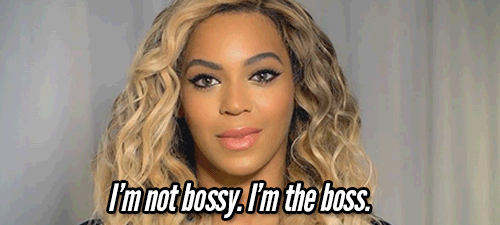
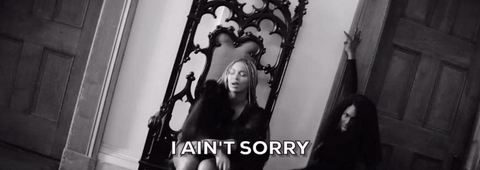
Always trying to Be More Beyoncé, Terri-Jane Dow is bored of apologising.
I apologise too much. I use "sorry" in place of "excuse me" and "pardon," I preface questions with, "Sorry, but...," and I would much rather leave all decision making to someone else. It's very British of me, apparently, but more than that; it's very specifically female. In 1949's She Wore a Yellow Ribbon, John Wayne stated that one should "Never apologise. It's a sign of weakness." It's a statement that seems to have hit Wayne's hyper-masculine target audience, but outside of that demographic? Not so much. There have been a lot of articles recently regarding studies into feminine language - in short, compared to men, women are both more apologetic, and more concerned with others' perception of their actions. Women are twice as likely to suffer from both anxiety symptoms and anxiety disorders. There are studies into the reasons behind this; women are far more anxious to be perceived as being “nice”, whereas men, generally, are differently conditioned to prosociality. A study at the University of Waterloo, in Ontario, Canada, found that when they’re in the wrong, men are equally as likely to apologise as women; it’s that they just don’t feel like they’re in the wrong as often. If, then, there’s no scientific evidence for women apologising more, it really is a case of social conditioning. Alongside this knowledge is the fact that the most successful people I know - the ones who speed, spider-monkey like, to the top of the ladder, and manage to juggle the work / life balance with ease - are also the least apologetic.
Instead of what the Wild West might have us believe, apologising is more a sign of accountability, or acceptance of a situation, than weakness. Unsurprisingly, Beyoncé reigns supreme on the issue of apology; Lemonade's ‘Sorry’ sees her utter refusal to accept responsibility for another's wrongdoing. It is this idea of implicit responsibility which creates tension and indecision. Though Queen Bey is talking about the responsibility within a relationship here, her words are applicable elsewhere. Intrinsically linked to constant apologising is an inner expectation of doing the wrong thing, or of failure. By apologising, one takes on blame and, in many cases, this is not only self-defeating, but also unwarranted. Instead of being sorry, Beyoncé sings, "You're interrupting my grinding" in a callback to ‘Formation': "I dream it, I work hard, I grind 'til I own it." Apologising, and all of the anxiety that goes along with it, merely gets in the way.
Recently, Gmail released an extension app called Just Not Sorry, designed to warn the user when they are using language which undermines their message. "Sorry, I hate to ask, but..." is an obsequious email opener I've typed more than once, and I'm certain that on an embarrassing number of occasions, Just Not Sorry's alerts would be flashing up on my screen so much that I'd have to force close the whole machine. It's a fairly sorry (pun intended) state of affairs when even your email account is telling you to be more assertive.
Assertiveness, however, is rarely seen as a positive female trait. In fact, not only is it a trait seen as "unfeminine," it's not even called by its actual name. Instead, assertive women are bossy, domineering, and overbearing. These are not adjectives we use to describe men. Assertive men are ambitious, focused, driven. The way we use language, and its gendered nuances, play a large role in the female desire to apologise. Even before making a request, it's pre-empted with a "Sorry, but..." as if to soften what will inevitably be seen as a demand. I, and many women I know, are understandably reluctant to be labelled as "controlling," and make excuses for perfectly reasonable, rational behaviour in order to avoid that label, which ultimately can have negative consequences on our success.
So, spurred on by Beyoncé and an attempt at cultivating a more positive relationship with myself, I've started an experiment. I'm deleting "sorry" from my vocabulary, unless it's necessary for an actual apology: i.e. a situation where I have done something wrong, and am making amends. If my work emails are littered with empty apologies that are just there as filler, to cushion what I'm actually asking, they're gone. It's not politeness, it's self-deprecation, and it undermines the position I'm actually in: one where I should feel able to request something without feeling like I'm asking too much. As far as my experiment goes, it's been surprisingly obstacle-free, even without the help of Gmail’s apps. I've not encountered any horrible repercussions from not saying sorry. No one has accused me of being rude, or bossy, or above my station. In fact, if anything, I've received a more positive response to the things I'm asking of people, and quicker results. It's almost as if the language I'm using is more accurately conveying the priority of what I'm asking. Imagine that!
Not apologising is forcing me to be more decisive; if I am refusing to apologise for (and therefore accept responsibility for) something that's out of my control, then I'm also being forced to treat myself more kindly. Without the frame of unnecessary apologies, requests become more focused; there's less distraction from the purpose of a query, and it produces faster results. As always - and it's a pretty good rule of thumb - we should strive to be a little bit more Beyoncé, and a little bit less sorry.
[Terri-Jane Dow]
7 notes
·
View notes
Photo
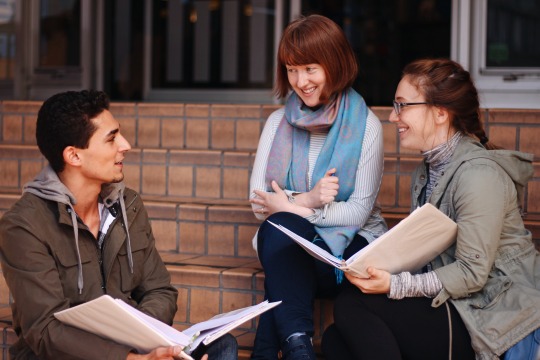
Clare Marcie interviews Lynda Radley about her latest play, The Interference, which just premiered at the Edinburgh Fringe.
So, The Interference - what is it?
The Interference is a play that I’ve written for Fringe which has a cast of 12 young people in it. It was commissioned by Pepperdine University, who every few years get a playwright from Scotland to write a play for their young acting students... I had been, as a lifelong feminist, really interested in things like online misogyny, but had also noticed a couple of instances of deep misogyny on campuses in the UK. There was the hockey team from Stirling University, then there was the debating situation at Glasgow University, where the two young women who’d come up from Oxford were shouted down and had comments made on their appearance. At the same time, there were a lot of grumblings about sexual assault cases on campuses in the States and how those were handled by colleges and how that shone a light on internal bias and a lot of rape myths that a lot of people carry within them.
So, thinking about all of that and trying to find something that worked for this group of young people, that’s when I came to this idea, and Cathy Thomas-Grant, the director, and Alex Fthenakis, the producer, were both really up for me exploring that. It’s about a young woman called Karen who is raped by the star quarterback. It has an uncanny resemblance of the story to the Stanford rape case. It’s uncanny in one way, it’s also tragically predictable in another way because the story of The Interference is all based on testimony and research that I’ve done of other cases and so actually the Stanford case has all the hallmarks of typical cases of that kind... It’s telling Karen’s story, but it’s also showing the way that she’s treated and believed or not believed by her teachers, by the police, her peers, her friends and the masses of anonymous online commentators who all decide that they have opinions and beliefs about the case. [It looks at] the way in which Karen is constantly re- traumatised by having to tell her story over and over again, being believed or not believed over and over again. Her attacker is not in the play and says nothing, which was a very definite choice.
That’s interesting, this idea of how telling a story can affect a person, and the fact that he isn’t really present in the story, and therefore doesn’t have to tell the story or engage with it in any real honest way. It lets him off the hook for actually confronting his own actions.
One of the things that I was really keen on was first of all avoiding the type of play that comes down to the ‘did this really happen?’ question because we’ve had plenty of those, thank you very much, and we don’t need any more of them. But also, I noticed that these guys tend to be able to access counsel and coaches that will speak for them, teammates that will speak for them, fraternity brothers that will speak for them, publicity coaches who will coach them on what to say or what not to say and all of that, whereas often the survivor in this situation, man or woman, doesn’t have that same network of support. [The perpetrators] have legions of fans who will hold up and maintain the image of the hero that they have in their minds regardless of the truth. Looking at the Stanford case again, we saw the letter that his dad sent to the judge, the letter that his sister sent to the judge, the letter that his friend sent to the judge, the letter that his mother sent to the judge, the letter that his aunt sent to the judge, but we’ve not heard a word from him, actually. And I think that’s kind of fascinating... Unless cases have strong evidence, prosecutors tend not to bring them to trial...
In a rape or sexual assault case, the onus seems to be on the victim to prove the guilt of the accused and that, plus the idea of re-traumatisation, the process doesn't really seem designed to keep the victim safe at all , or even just keep them psychologically well enough to continue the process...
And so many people drop out... I am a witness in an ongoing trial in Scotland at the moment and I’ve been called to court six times in the last 12 months where my case has not actually gone ahead and I’ve been sent away again, and that led me to think about how difficult that would be for a vulnerable witness. [Organisations like] Rape Crisis offer support but, even with that, it must still be incredibly difficult. We had this guy called Jeff Baker who’s a law professor at Pepperdine and also does a lot of pro bono work with his students and he has a lot of experience dealing with sexual assault and domestic violence cases. He was [telling us] about criminal cases when it’s about the State versus the alleged perpetrator - the State doesn’t represent [the victim], so she still has no say over how the case is run. It’s similar to the way in which Reeva Steenkamps parents didn’t have any say over how the case went against Oscar Pistorius...
One of the questions that came up during the week of the workshop was: why do people report? Why do people not report? I think the idea of what consent is - teaching consent, talking about consent - is a huge part of this...
And it’s more likely to be someone you know - the guy next door, the friend...
It’s hard as a feminist because, when you’re talking about [those issues], there’s the danger of falling into the ‘all men are potential rapists’ trap, and of course that alienates a lot of men in the movement which is not at all what you want. But it is about saying that we need to do young men a favour and teach consent...
The fact that this is set on a campus means that it’s in a context of privilege. I love sport but I think that we need to think about what we are doing to young people who engage in sport when we use language which is about, ‘you can get whatever you want, you must / you will destroy whoever you need to destroy to get to whatever you want’ - all those things in terms of their interpersonal relationships. And are we doing them any favours by holding them up and putting them on pedestals to such an extent that they feel untouchable? What’s fascinating about many of these cases is how, especially when there’s more than one young man involved, like in Steubenville, is how much they’re prepared to text each other and Tweet each other about what’s happening, and then they leave a paper trail of evidence. They have either no sense that they’re doing anything wrong, which is a terrifying thought, or equally terrifying, they do know they’re doing something wrong but they don’t care because they feel that the rules don’t somehow apply to them. A lot of that comes back to victim blaming. There’s a sense of ‘well, she did this this so she had to know to expect this outcome’...
[In the play] we’re talking about the young man in question and we’re talking about Karen (the victim) but we’re also talking about you know the people who believe her or don’t believe her. In the case in the States, there are interdisciplinary panels who pass the disciplinary judgement within the university and that’s made up of undergraduates, postgraduates, administrators, teachers,but still that bias is really clear. There’s also the opinions of the general public which play out online, which we can get an insight into now that we couldn’t get before. The invention of the bottom half of the internet, as I like to call it, is terrifying - what you see there and how many people feel justified in holding opinions that are not based in fact, making unbelievable judgements about victims...
What has your experience with the cast been like?
They are really determined. They really believe that theatre can change the world... I got so much energy from them. It is difficult for the guys in the room and you want to say to them that we’re not in any way trying to say that all men are like this. A number of the guys had played football at some point or other, and the characters that they were able to get their teeth into were the bystander characters. There’s a guy called Teammate One who’s the one who was there on the night, and who may or may not have understood what was happening. There are also some other teammates who just blindly believe in their friend. A character at one point calls into the TV sports show saying, ‘I’m really worried that actually I might’ve raped someone and I just didn’t know it’. One of the things that we kept saying during the course of the week was we’ve all been Teammate One in some way or other in our lives at some point - be it that you heard a rape joke and you laughed along with everyone else, or you heard your friend speaking about a woman in a particular way and didn’t confront them. Women or men, we’ve all done it. They were very brave. They were very prepared to ask difficult questions and to make their feelings clear. At various times we all had our perspectives changed, and I think that’s what it’s all about.
What did you think of the Brock Turner case, because that happened after you had started creating this piece. Did you read the victim's letter?
I did and it was extraordinary. Reading her letter was the first time in all of this process that I just lost it on an emotional level myself, at home in my room reading it, and was really in tears. I suppose when you’re writing a play, you start off from a place of passion and that passion continues but you’re thinking about all of the different points of view within the play, all of these different characters, trying to understand all of them. That has a huge amount of the work that we did in the workshop as well with the young people, which is them saying, ‘no one thinks they’re the bad guy right?' And you’ve got to understand where they’re coming from. It’s not about portraying anyone as being totally evil. That’s not very interesting dramatically. But it just really brought me back to thinking about young women at the centre of all of this. I have so much admiration for her. That letter was extraordinary because it took the story into a different stratosphere of consciousness where people read it who might not normally have come across that kind of article. We all convince ourselves that everyone reads everything that we read on the internet, but of course they don’t. I think that what was interesting was the way that her letter stood in deep contrast to the other letters that we read in support of him. It’s totally understandable that a parent is going to plead for leniency for their child, but it’s the lack of understanding, the sort of sense of ‘my son could ever have been guilty of this crime’...
I also thought it was really interesting how she remained anonymous, and everyone knows his name. That’s a subversion in a way of what we’ve come to expect. He’s not protected. We all know his name and in some ways he has become a sort of face for rape culture in America.
Rape victims are often anonymous and what’s interesting about that is, because we don’t see their faces and because we don’t hear their voices a lot of the time, it allows people to project all sorts of things onto them that are not necessarily the truth. There’s been a number of high profile cases recently as well where those people have had their anonymity taken away from them - they’ve been named and shamed - so there’s a sort of tension and a disconnect there that has something to do with the law, which is there to protect them, and the modern world that we live in, which:
a) a lot of people didn’t understand that that law was even there, and
b) it’s not necessarily possible to enforce that protection anymore and I think that’s another way in which we need to look at how we are helping…
If you know someone’s face and name, what does that mean? That can be good and bad simultaneously.
I don’t necessarily think that the law should be changed. One of the reasons why I wanted to write this play was to ask the audience to think about whether there is a difference when you do know her - she’s a person and you see her....
[Clare Marcie]
The Interference will be on at the Edinburgh Fringe until 16 August. Tickets are on sale now. Find out more about Lynda by visiting her website and get more information about the show at peppderdinedrama.com.
#tyci#feminist#feminism#rape culture#brock turner#lynda radley#pepperdine#edinburgh fringe#clare marcie
1 note
·
View note
Audio
#LADYSOUNDS summer special is here!
https://open.spotify.com/user/tyciblog/playlist/2PIc32UU0MehCmX8K7WrBZ
#tyci#feminist#feminism#spotify#playlist#mix tape#julie ruin#grimes#chvrches#hayley williams#adele#wolf alice#melanie martinez#fka twigs#lana del rey#misterwives#aurora#potty mouth#carly rae jepsen#pvris#mo#bat for lashes#sia#daughter#florence and the machine#ellie goulding#ex hex#ladysounds
1 note
·
View note
Photo
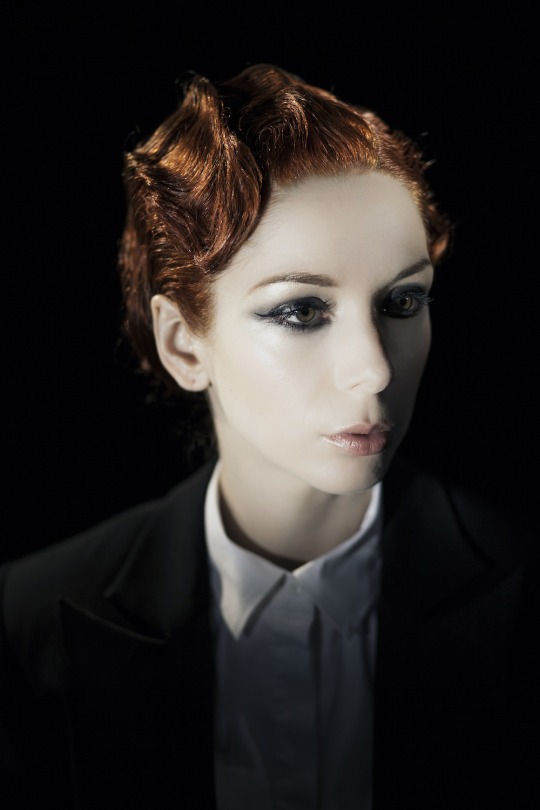
Rebecca Moore interviews The Anchoress ahead of her show in Glasgow next week.
Congratulations on the release of Confessions of A Romance Novelist. What has the response been like? How do you feel post-release?
Thank you! I make a rule not to read reviews (for my own sanity) but of course I’ve seen the pull-quotes on the website and it’s nice to see that the response has been, on the whole, a very welcoming one. It’s a relief to have the album finished and out there after such a long journey to get to this point. I’m very much focused on the next album project now and not losing the momentum of working. How do I feel post-release? Busy...
How did you first get into making music and how does this compare to where you are now?
I started out just teaching myself how to do everything. I was just really fascinated by the process of putting tracks together and making songs from layers of overdubbing. In this regard not much has changed, except when I’m on tour and practicalities dictate that I have to be away from the studio. I try to maintain the day to day discipline and routine of practice and work that I’ve always had. I think that dedicating yourself to constantly learning and improving - be that in terms of practicing your instruments or expanding your skills in the studio - is a good habit to get into and one I hope I don’t lose.
How would you describe your sound to our readers?
I’m really bad at describing my own music to people but I think Prog magazine summed up my intentions really well when they talked about the album as being “Kate Bush’s Hounds of Love updated for the 21st century”. I’ll take that!
What inspired Confessions?
The album was a culmination and cumulation of all of my influences and inspirations, which I think is what a debut record should be. I was hugely inspired by the production aesthetic on album’s like Kate Bush’s The Dreaming. I wanted to get across a sense of all the competing voices in our heads and the playfulness in the production and sampling hopefully captures some of that. It’s impossible to pin down all the musical influences that went into its making: Prince, Bowie, The Carpenters, ELO, Fiona Apple, Deftones... At the same time I was drawing on all the reading I’d done while studying at university.
You’re playing at the CCA next week. What can our audience expect from your live performance?
It’s going to be something quite unique to Glasgow as I’m not able to bring the full band up to Scotland for these two dates. We are hiring in a beautiful Steinway grand piano and I will be bringing a couple of my string players with me to play a stripped back version of much of the album. We are also looking forward to supporting the wonderful Kathryn Joseph the following night in Edinburgh. I really adore her album.
You also play session for the likes of Simple Minds. How does touring as a solo artist differ from your time in other projects?
You certainly don’t have the huge team of people around you as I do in Simple Minds. When I play with them there’s an amazing group of highly skilled individuals who make you look and sound your very best every night which makes every night onstage an absolute dream. Obviously, with my vastly smaller touring budget we aren’t able to have that luxury so it’s very much all hands on deck with getting the sound right and transporting equipment and gear!
Tell us about your experience of doing a PhD and your work as an author. Do you think this work has influenced your music in any way?
There’s definitely a literary theme to the lyrical and conceptual framework of the album. The record comes with a reading list and each song has its own quotation to direct the listener to the deeper intentions behind the song but I don’t tend to lift anything directly from books or plays in the way Morrissey does. It’s more of an insidious influence. Studying American poetics certainly makes me hyper aware of metre and the musicality of words. I hope this comes across in the care and attention that goes in to structuring the songs.
How did you end up going from academia to becoming a full time musician and producer?
It wasn’t a programmatic shift as such. I had a scholarship to study for my Masters and then for my PhD so academia enabled me to start making music financially speaking, as living in London would have been impossible for me otherwise. Slowly, the music started to become a bigger part of my day than going to the British Library and eventually took over. I still wouldn’t call myself a “full time musician”. I will always read and study and I still dip in and out of the academic world.
How do you deal with the music industry as a female? Any advice for aspiring female musicians?
Be good at what you do. Don’t let people underestimate you. Be a person who makes music rather than a gender. In time things will change if we are visible enough in being great at what we do. Cultural shifts happen when mentorship and visibility become second nature and the next generation doesn’t even question whether or not a girl would pick up a guitar or man a sound desk.
You recently collaborated with Paul Draper, aka Mansun, for your latest album. How did that come about and what was it like working together?
Paul contacted me after hearing my self-produced demos and it evolved into a very creative working partnership. He sings on the song You and Only You and also played guitar on some of the tracks. It was quite a natural evolution of our working together over such a long period of time and now I’ve co-written seven songs with him for his solo album project, which should come out some time next year.
Word has it you are also collaborating with Bernard Butler guitarist and songwriter with Suede, for your next album. What makes you want to collaborate with other artists like Bernard and Paul?
I think that the collaboration arises quite naturally out of the state of being a solo artist. When you’re in a band you’re naturally in an environment where you are constantly collaborating with other musicians but it can be quite isolating after a while as a solo artist when you are writing, recording and playing everything yourself (as I did when I started out). The only difference here is that I’m creating my own “band” for each album. Bernard is a phenomenal guitarist so it’s a real privilege to get to work with him. I really look to the way David Bowie worked to see how great creative leaps can come about by working with the best musicians out there. Bowie and Prince were both never too afraid to collaborate in order to take their music to a new space.
How important is it to you that you have autonomy over your own work?
Autonomy is everything to me in terms of being fulfilled creatively and being happy making music. Having briefly been on the other side of that, I would sooner stop making music than make myself unhappy doing so in a way that I didn’t feel in control. That said, I don’t believe that you have to sacrifice working with others to maintain your vision - as the examples of Bowie, Kate Bush and Prince show. It’s important if you are to continue evolving and create the best possible work to play with the best rhythm section you can find, work with the best mix engineers and technical team. Just don’t let anyone else tell you how you should sound or what you should be creating.
[Rebecca Moore]
Confessions Of A Romance Novelist is out now on iTunes and available to stream. The Anchoress plays the CCA in Glasgow on 5 August. Tickets are on sale now.
#tyci#feminist#feminism#the anchoress#simple minds#cca glasgow#synergy concerts#confessions of a romance novelist
2 notes
·
View notes
Photo
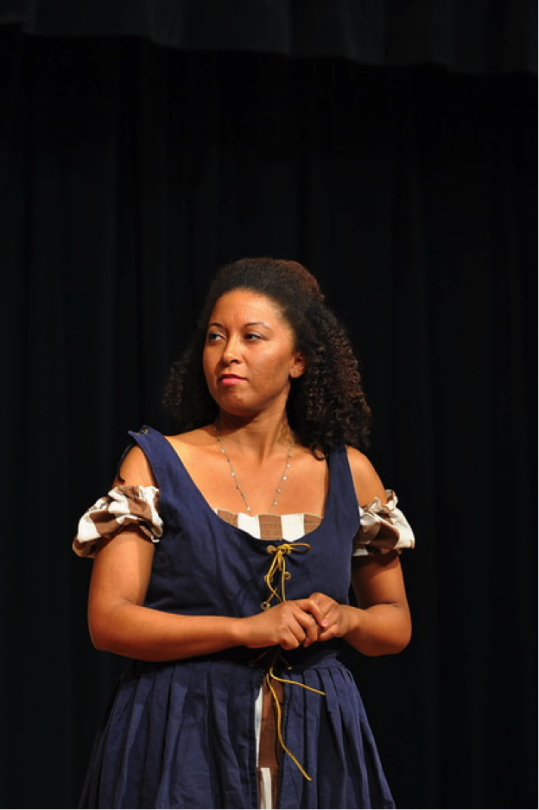
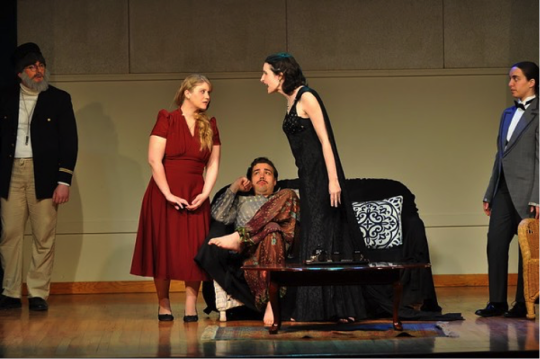
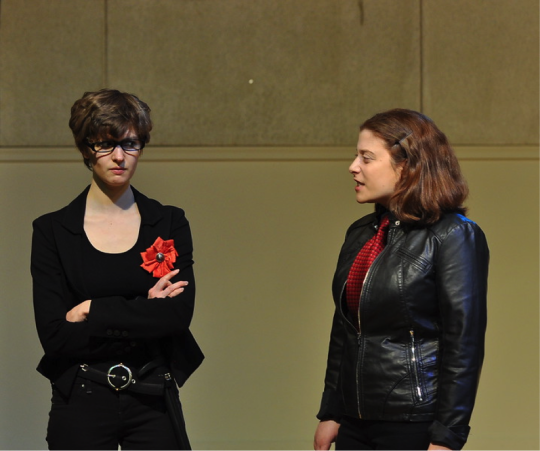
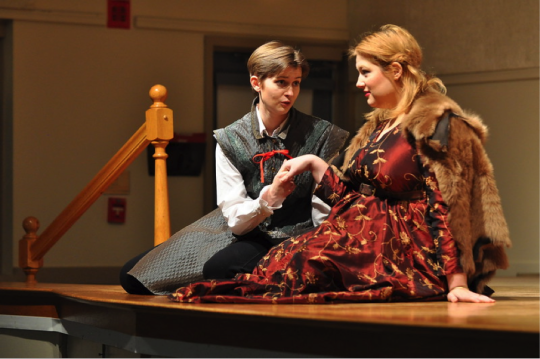
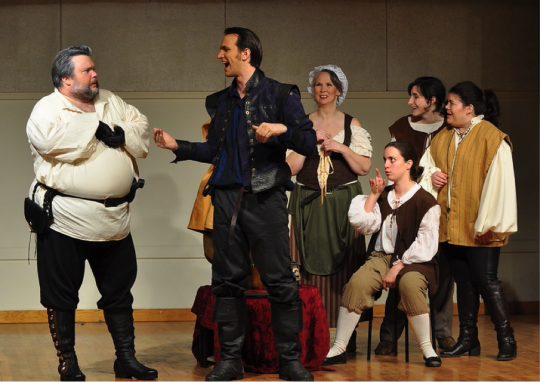
Sarah Brosenstern interviews Arielle Seidman, Artistic Director for Britches and Hose, a gender-blind theatre group in Northern Virginia, U.S.A.
With today’s ease of streaming video to cell phones, computers, and home televisions in a matter of seconds, it is a sad reality that many young people today have a limited exposure to live theatre. Yet there are many community theatre groups out there who seek to make live theatre more accessible to their local communities. Recently, I touched base with Arielle Seidman, a longtime friend and the Artistic Director for Britches and Hose, an American gender-blind theatre group whose actors hail from Washington, D.C. and the nearby states of Virginia and Maryland.
Tell me a bit about Britches and Hose. What prompted you to start this troupe?
Britches and Hose is a gender-blind theatre company in Fairfax, Virginia. We founded the company in 2010, only a few months after I graduated from Bryn Mawr College in Philadelphia. Bryn Mawr had (and still has as a matter of fact) a student performance company called the Shakespeare Performance Troupe, or SPT, which was one of the most body-positive, open, welcoming theatrical groups I'd ever been involved with. As the name implies, SPT focused primarily on Shakespeare plays as they were free and easy to produce on a low budget. My idea, when I began Britches and Hose, was to create a company sort of like SPT, where the company was welcoming and inclusive, the productions were focused on character more than spectacle, and which provided a wealth of rewarding theatrical community to everyone involved.
Originally the troupe started as an all-female organization. There are now male actors in the troupe, but the troupe has remained committed to gender-blind casting. Why is gender-blind casting important (particularly for women), and what does this offer the arts community?
We at Britches and Hose are committed to gender-blind casting because it opens doors to everyone. We allow skill, talent, reliability and dedication to dictate which roles a person receives, not gender or gender presentation. One of the best Juliets I've ever seen was played by a man, and absolutely my favorite Richard III of all time was played by a woman. Acting is about stepping out of yourself and embodying someone else, and I don't think you should be limited only to the roles that are traditionally assigned to people of your biological sex. For women, specifically, this means far more acting opportunities, and thus more opportunities for growth as a performer. Last year, I was given the chance to play Brutus from Shakespeare's Julius Caesar, and that was probably the most challenging role I've ever taken on. I learned a lot about myself as an actor and I developed new ideas and techniques about the theatre just from working my way through the performance of that role, but that role, a tragic protagonist, is almost always reserved for men. Women, too, need opportunities to play life's heroes and villains. How often have you, Sarah, seen a play and said, "Wow, I absolutely LOVE that role, but I could never play it because that's a male role?" Britches and Hose doesn't believe that problem has to exist.
Why do you think community theatre often doesn't engage in gender-blind casting? Do you see any hope for increasing this practice?
There are some other local groups that do gender-blind casting, but it's not common. You see it more often in companies that do Shakespeare plays, and the other day I saw that a group in Loudon was auditioning for a production of Moliere's Scapin, with some roles cast gender-blind. I think most people cast traditionally, according to gender, because it's easier and more obvious. I think it honestly doesn't occur to some people that one could even cast a man in a female role, or a woman in a male role. Other people assume that a woman playing a male role or a man playing a female role won't be convincing enough to pull off the character. I've heard people say things like “Men playing women's roles or women playing men's roles is very often distracting and ridiculous." It's a terrible shame, really, because I think Britches and Hose has disproved that particular remark time and time again.
What genre does the Britches and Hose troupe typically focus on for its productions? Also, I hear you do some creative writing independently of the troupe. Are there any plans for the troupe to perform pieces that are written by Britches and Hose members?
We typically perform either plays available in the public domain, such as Shakespeare and Oscar Wilde, or original works written by company members or local playwrights. Our New Works Festival of entirely original one-act plays is coming up in a few months! I was actually hoping you'd audition for that, Sarah. I mean, you know, no pressure. As to whether or not we'll be performing any of my original work, that'll depend on whether or not I can come with anything that impresses the board before the submission deadline passes... Stay tuned!
What would you say are the biggest challenges that the troupe has had to address since its founding?
Oh my goodness, isn't this a question. What are the biggest challenges we've faced? Well, honestly, I think they've been primarily financial. Theatre is an expensive prospect, and we've struggled a few times to find suitable venues for our productions, venues within our price range. We've also had some disastrous run-ins with the weather, and I think there have been three shows over the course of the last five years that have gotten either snowed out or have had attendance significantly diminished by major storms. I will say that our membership, a very talented, very resilient, very dedicated group of performers and technicians does significantly mitigate those challenges. We may not have any control over the price of performance space, or over the weather, but our people are remarkable for their attitude and their follow-through, and that helps us get through the worst of times.
What are your hopes for actors working with Britches and Hose? What do you hope they take away from the experience of working with the troupe?
I would like not only the actors, but also the techies and anyone involved with Britches and Hose to feel safe taking risks, making mistakes, having adventures, and to feel like part of a theatrical community, even a family. Britches and Hose is a place to take advantage of opportunities, to grow as performers and as people, and to maybe to find your theatrical niche. I also feel strongly that the Britches and Hose are all team players; I say it a lot, but theatre is a team sport. Not only do you need to look and sound good onstage, but your goal should be to make everyone else onstage look, feel, and perform better as well.
What advice would you offer for someone who is new to theatre or who is interested in starting their own theatre company?
If you're thinking about getting involved with the theatre, go for it. We'd love to have you, and it's a wonderful form of expression, a social opportunity...there are a hundred wonderful things about the theatre. If you're planning on starting a theatre company, start playing the lottery, regularly, now. Also, and I mean this in all seriousness, pick yourself a good team. Don't try to do everything by yourself; it's essentially impossible. Find some people you trust, competent people, people who have the same vision as you do for where they want the company to go, and form yourself a team, because you will succeed a lot faster that way, and your product will be a better, longer-lasting one. This is, by the way, a shout-out to Leandra Lynn and Dan Clark, the Managing and Technical directors of the Britches and Hose Shakespeare Company.
[Sarah Brosenstern]
All photos courtesy of Britches and Hose. Sarah Brosenstern is an American writer on social issues in the Washington, D.C. and Baltimore, Maryland area. For more of Sarah’s work, visit her website.
#sarah brosenstern#tyci#feminist#feminism#gender blind theater#theatre#theater#shakespare#art#britches and hose#leandra lynn#dan clark#Arielle Seidman
0 notes
Photo

July's #LADYSOUNDS theme is here! We all know music festivals have a diversity problem - but we want to celebrate the female artists you ARE excited about seeing at festivals this summer. Tell us your tracks suggestions underneath this image and we'll publish a playlist to Spotify later this month.
3 notes
·
View notes
Photo
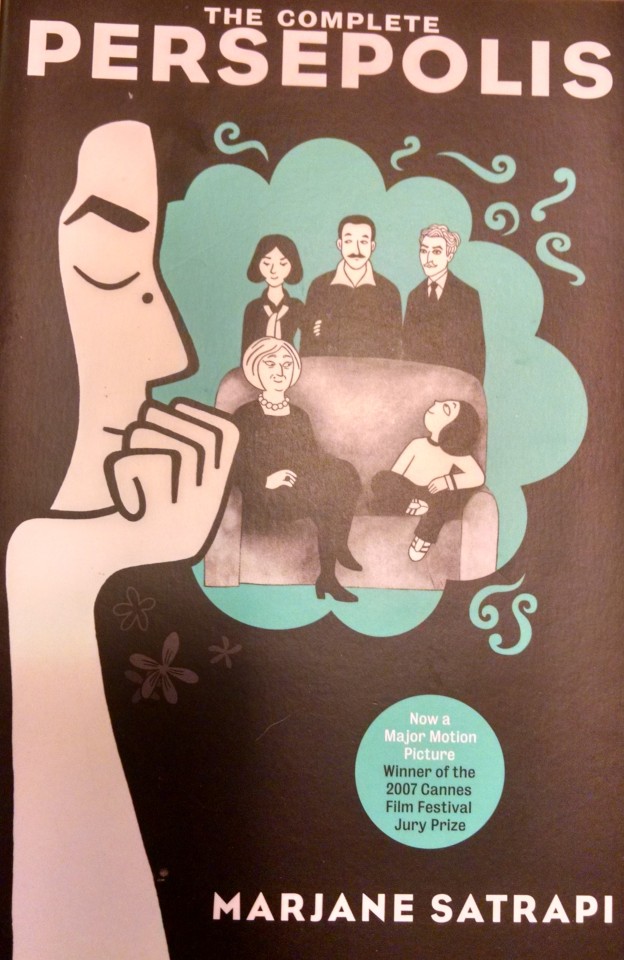
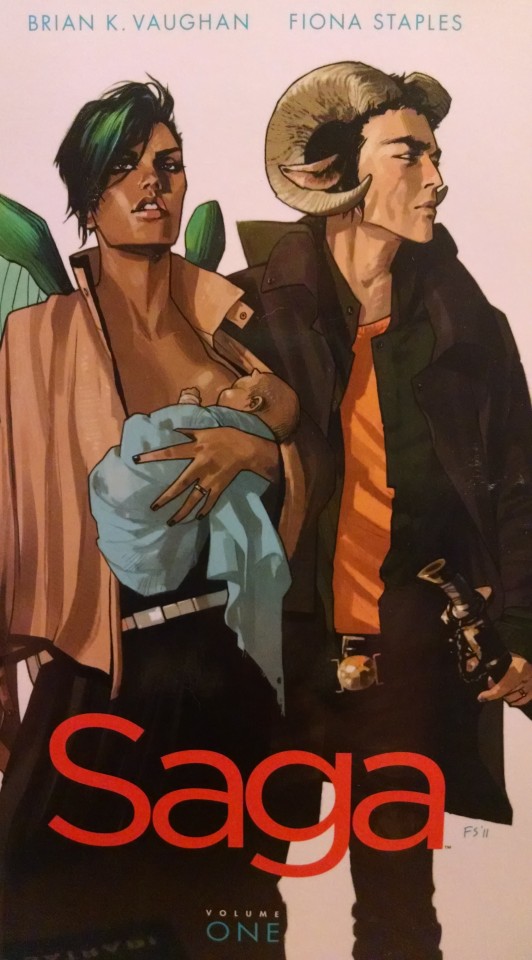
Sarah Brosenstern discusses women in comic books, graphic novels, and gaming.
When feminists think of women in comic books, graphic novels, and gaming, we often cringe. Images of scantily-clad women with no other purpose than titillating (pun intended) the psyche of young men are often the first in a series of negative images that come to mind. For empowered women everywhere, these women can represent the worst of the patriarchy; their bodies are idealized to the point of almost being caricatures, they are overtly objectified and sexualized (to the point where any functional aspects of their wardrobe have been discarded), and their characters are often trapped in the binaries of the damsel in distress/seductress archetypes.
Yet all is not lost. The world of comic books, graphic novels, and gaming has been undergoing an interesting (albeit gradual) cultural transformation that has brought more complex, female characters to the scene. This transformation has brought new, complicated, female characters to light, and recent works on vintage comic book characters have also exposed intriguing backstories to classic characters; histories that may change the way we think about comic book heroines. This summer, I would highly encourage any of my fellow comic book/graphic novel/gaming nerds to explore the following:
Persepolis by Marjane Satrapi
Persepolis follows the experiences of the author, Marjane Satrapi, growing up during the Iranian Revolution. A poignant graphic novel, it provides insight into the thought process of a young girl from a cosmopolitan Iranian family - who is attempting to understand the rapidly-changing world around her.
Saga and Y The Last Man by Brian K. Vaughan
Brian K. Vaughan’s work has brought fascinating, complicated female characters to the word of comic books/graphic novels. Saga follows the journey of two star-crossed lovers from warring planets who are on the run with their infant - borne out of an illicit affair between a female soldier and a male prisoner of war. The comic addresses themes of racism, war, masculinity/femininity, human trafficking, and many other issues that transcend the vibrant universe that Brian K. Vaughan has built. Y The Last Man is no less powerful, and explores a world in which almost all of the men have been killed by a mysterious ailment. Darkly funny and complex, both series bring profoundly flawed but compelling female characters to life.
The Secret History of Wonder Woman by Jill Lepore and the accompanying National Public Radio Interview
This exploration of the classic comic book icon, Wonder Woman, delves into the creation of her character and the fascinating personal life of her creator, William Moulton Marston. Marston, a psychologist who lived a secret life with his wife and his mistress (the niece of women’s rights activist Margaret Sanger) was heavily influenced by women’s suffrage movements, erotic art, and presumed lesbianism in classical Hellenic mythology/literature. Jill Lepore’s book (and the associated National Public Radio interview featuring her) is a fascinating look at the development of a classic comic book character who, along with her creator, defied the social norms of the time.
Chell from Portal
Another classic, Chell is the often under-rated protagonist of the Portal video/computer game series - which features a set of puzzles in which the player (Chell) has to open various “portals” within rooms in order to manoeuvre through the game. Sure, Chell doesn’t say much of anything – but she is an important character to the gaming world in that she isn’t particularly sexualized, and she relies on her wits to move her through the game. Chell is a far cry from the loincloth-clad enchantresses of fantasy games; nor does she fit in with the prostitutes who are so often part of the background noise for games set in urban, gritty, environments. Chell is not only an important character, she is the character for the Portal games, and she spends her time reasoning her way out of her immediate predicament.
So this summer, relax a bit and indulge your comic book/gaming-nerd side. There are some fascinating characters out there.
[Sarah Brosenstern]
Sarah Brosenstern is an American writer on social issues in the Washington, D.C. and Baltimore, Maryland area. For more of Sarah’s work, visit her website.
#persepolis#saga#y the last man#portal#jill lepore#sarah brosenstern#graphic novels#comics#comic books#art
11 notes
·
View notes
Photo
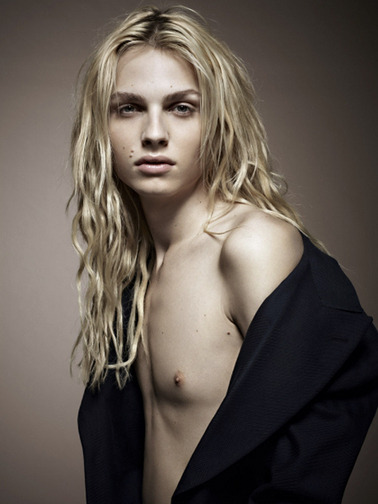
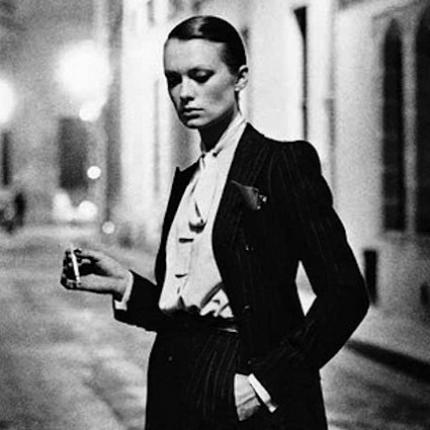
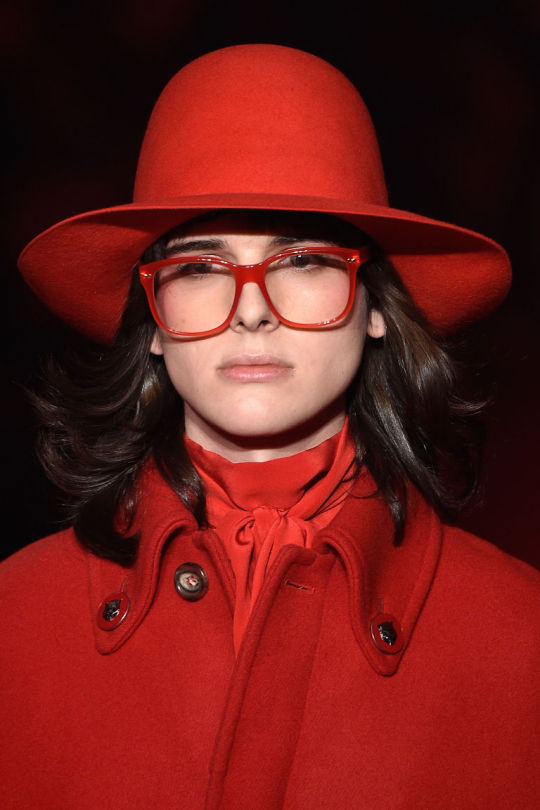
Amy Rodgers asks if fashion can challenge perceptions and raise awareness of trans issues.
“People often write fashion off as frivolous, but by inducing gender- nonconformity in the dream-life we offer to consumers, we show our power as a progressive force.” [1]
Gender blurring in fashion is nothing new of course. From Marlene Deitrich donning a man’s tailcoat in the 1930s film Morroco to the more Givenchy skirt wearing Kanye West, expressing ones gender ambiguously through clothes has become prevalent in the fashion world.
Transgender model and activist Hari Nef in a recent interview however, is more cynical, stating that “she does not think fashion is a fertile ground for a discussion of gender.” [2] Nef claims that rather than disrupting gender norms, images and genres in fashion that are supposedly “subversive” to gender actually just reinforce the binary.
You can see her point. Let’s look at YSL’s LE SMOKING for example. This women’s tux, which was essentially a reinterpretation of black tie menswear, was a controversial statement on femininity and masculinity – it marked a sexuality that did not rely “ruffles or exposed skin, but instead smouldered beneath the sharp contours of a perfectly cut jacket and trouser.” [3]
While garments like this did play a significant role in changing perceptions around the ways in which men and women should dress, when taken out of their background and history and proclaimed as subversive today, they become weak. Nef sums the issue up well: “If a woman is sourcing power from a signifier of stereotypical masculinity, then how sustainable is that?” “If a woman is putting on a suit and taking it off, is that really subversion of gender binaries or is just a reinforcement of that binary as we know it?”[4]
I disagree with Nef in some respects, and agree in others. Disagree because we cannot ignore that fact that fashion clearly has potential to offer people ways to explore gender in ways that they may have not thought possible. At its core, fashion is about identity; clothes are used to to reconcile tensions between our inner and social selves. It has such a compelling influence over the way we feel and think about our bodies.
In fashion, individuals are able to escape gender by playing with the rules that have created it. Clothing allows people to encounter and play with new aesthetics and new propositions for being a person that isn’t usually offered in day to day life. Different kinds of beauty are offered in fashion … Not just mainstream femininity and masculinity.
Through clothes, men can access their femininity and women their masculinity. The result of these gender crossings is that the distinction between man and woman is disappearing. At least aesthetically. But that qualification is important, and the reason I also agree with Nef to some extent. Fashion allows us to challenge gender norms aesthetically. Outside of aesthetics in fashion, there is a long way to go: “Fashion is having a moment with trans aesthetics, not trans issues.” [5]
Fashion, unfortunately, has a sinful history of drawing inspiration from other cultures aesthetic, without giving due consideration and attention towards the history and issues within the culture itself. A recent example being Valentino’s spring show this year which was apparently “African-inspired”; it featured fewer than 10 black models. [6]
Fashion has embraced androgyny and gender bending styles. Selfridges' unisex Agender department is good example.[7] This issue though is that “unisex” is not subversive. Unisex, by definition is “designed to be suitable for both sex, a style in which me and women look and dress in a similar way.”[8] Unisex by definition then, still works within the gender binary. Notably, the models used in these campaigns are often male and female presenting, not gender non-conforming.
It is one thing to embrace the visual styles, but another to embrace the lived lives. A few years ago, trans model Andreja Pejic was told by a casting agent prior to her transition not to go through with it. The reason she was told? In fashion, “It’s better to be androgynous than a tranny.”[9] (Thankfully, she ignored this advice and her career has flourished post-transition.) Fashion needs more trans and gender non-conforming models. And even then, we must go further. Most trans people are a world away from the glitzy existence of top model. An increase of trans people in roles at the forefront of fashion generally must happen; make-up artists, casting agents, photographers are still badly under-represented.
Fashion has the power to demystify and raise awareness around trans issues. But clothing alone in fashion, although significant for self-expression of identity, will not subvert gender norms. Fashions challenge to the gender binary should not just be an aesthetic-borrowing trend. To be clear, fashion borrowing trans aesthetic is a good thing; it enables people to see and carry out ways of being they did not think possible. But it is more about considering the people in the clothes and what they’re doing to challenge the gender binary, as opposed to relying on the clothing itself to disrupt the gender binary. Instead of associating gender binary disruptions with the garments themselves we need to look more at the person or the identity behind them.
[Amy Rodgers]
Amy is a masters student at the University of Glasgow. Her research concerns the effect of queer theory on gay and transgender legal rights. For more of her writing, visit her blog.
[1] vogue.com/13377904/fashion-embraces-gender-blurring/
[2] fashionista.com/2016/05/hari-nef-fashion-gender-subversion-moma
[3] anothermag.com/art-photography/1869/helmut-newtons-le-smoking
[4] fashionista.com/2016/05/hari-nef-fashion-gender-subversion-moma
[5] vogue.com/13266980/hari-nef-sounds-off-trans-issues-fashion
[6] fashionista.com/2015/10/valentino-spring-2016-hair-cornrows
[7] theguardian.com/fashion/shortcuts/2015/mar/18/one-style-suits-all-as-unisex-fashion-gets-on-the-agender
[8] wikipedia.org/wiki/Unisex_clothing
[9] huffingtonpost.co.uk/2015/04/22/transgender-model-andreja-pejic_n_7116032.html
2 notes
·
View notes
